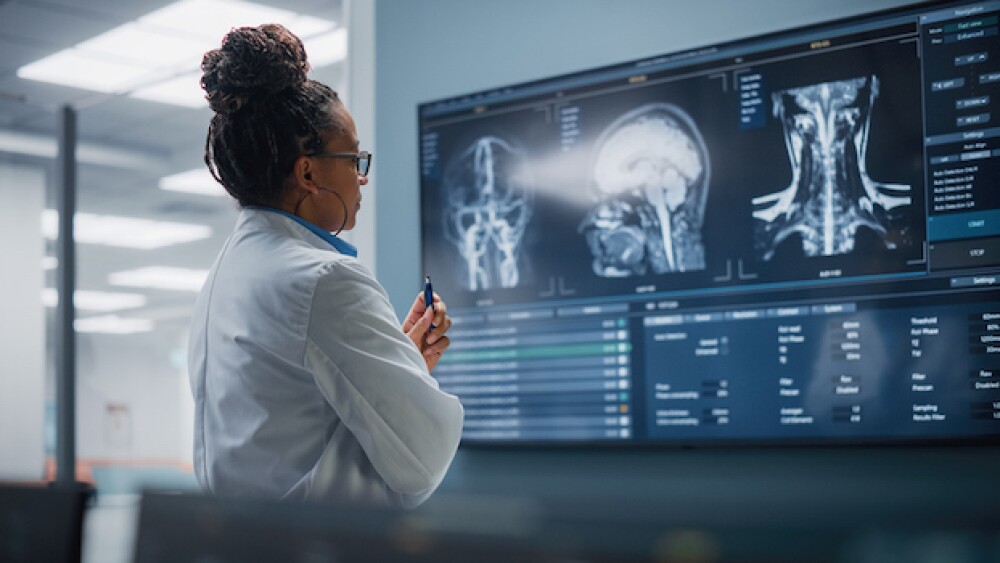For people with, or at risk for, SOD1-ALS, the FDA’s approval of Qalsody is an important step toward advancing gene-specific research for this uniformly fatal disease.
Pictured: Female scientist looking at an MRI of the brain/courtesy of iStock
For Biogen, Tuesday’s FDA accelerated approval of Qalsody (tofersen) is a boon for a company in the midst of a redesign, but for superoxide dismutase 1 (SOD1) ALS patients like Todd Legg, it’s an important milestone in advancing gene-specific research for this uniformly fatal disease.
Legg, who was diagnosed with SOD1-ALS in August 2020, entered Qalsody’s Phase III VALOR trial in October of the same year and the open-label extension study in April 2021. As VALOR was blinded, Legg doesn’t know if he was on the drug from the beginning, but his experience leads him to believe that is the case.
“The first few months of the trial, I was still declining very quickly, and then around month four, things started stabilizing a little bit and kept stabilizing more and more,” he told BioSpace. “I don’t want to say that it’s flat now and there’s no decline, but it’s way, way better than it was [at the beginning of the trial],” Legg said he specifically has seen improvement in his muscle strength and breathing.
Qalsody is the first approved therapy for a genetic form of ALS. And beyond SOD1, Legg said the FDA’s decision could encourage more investment into other genetic causes of ALS, as well as the sporadic form of the disease.
Approximately two in three people with familial ALS—and 1 in 10 with sporadic ALS—have a mutation in at least one of the more than 40 genes linked to the disease, according to the ALS Association. These genes include SOD1, C9orf72, TARDBP and FUS.
For Jean Swidler, chair of Genetic ALS & FTD: End the Legacy, having a therapy that is proven to modify the disease process of SOD1-ALS “is a big deal” because it could lead to other drugs and interventions that can modify the biology of ALS in a measurable way.
Swidler’s organization is made up of and supports asymptomatic genetic carriers of ALS and frontotemporal dementia (FTD) as well as people at risk of inheriting genetic mutations that cause these diseases.
“There’s rationale for using [Qalsody in people with SOD1 mutations] before there are clinical symptoms that would normally be associated with the disease, so that’s super exciting for our community,” she told BioSpace.
Indeed, Biogen is now testing the therapy in 150 presymptomatic individuals with a SOD1 mutation and elevated neurofilament light chain (NfL), the biomarker on which Qalsody’s accelerated approval was based. The trial, which will serve as the confirmatory trial to keep Qalsody on the market, is more than half enrolled, a Biogen spokesperson told BioSpace in an e-mail.
Next Steps
Qalsody has not yet been assigned a price, but the Biogen spokesperson said it “will be priced within a range comparable to other recently launched ALS treatments. [Biogen] believe[s] this strikes the right balance between the scientific and clinical innovation [the drug] delivers with the need to get this treatment to patients as quickly as possible.”
Amylyx’s Relyvrio, approved in September 2022 for the treatment of sporadic ALS, for example, carries a price tag of $158,000 per year.
Qalsody will be available for shipment to U.S. healthcare providers in approximately one week, according to Biogen.
Meanwhile, some in the space are hopeful that more ALS treatments are not far behind. That Qalsody’s approval was based on NfL establishes a pathway for other ALS therapies being evaluated based on biomarkers. One of these companies is Cambridge, Mass.-based QurAlis, which targets stathmin-2, a protein involved in neural repair and axonal stability that is downregulated in nearly all people with ALS.
In a March interview with BioSpace, QurAlis CEO Kasper Roet highlighted the importance of the advisory committee meeting for Qalsody, and said he is excited to see biomarkers move to a more mature space in ALS.
Legg relayed the words of his doctor, who told him, “This is first generation. It only gets better from here.”
Heather McKenzie is a senior editor at BioSpace, focusing on neuroscience, oncology and gene therapy. You can reach her at heather.mckenzie@biospace.com. Follow her on LinkedIn: https://www.linkedin.com/in/heathermmckenzie/ and Twitter: @chicat08






